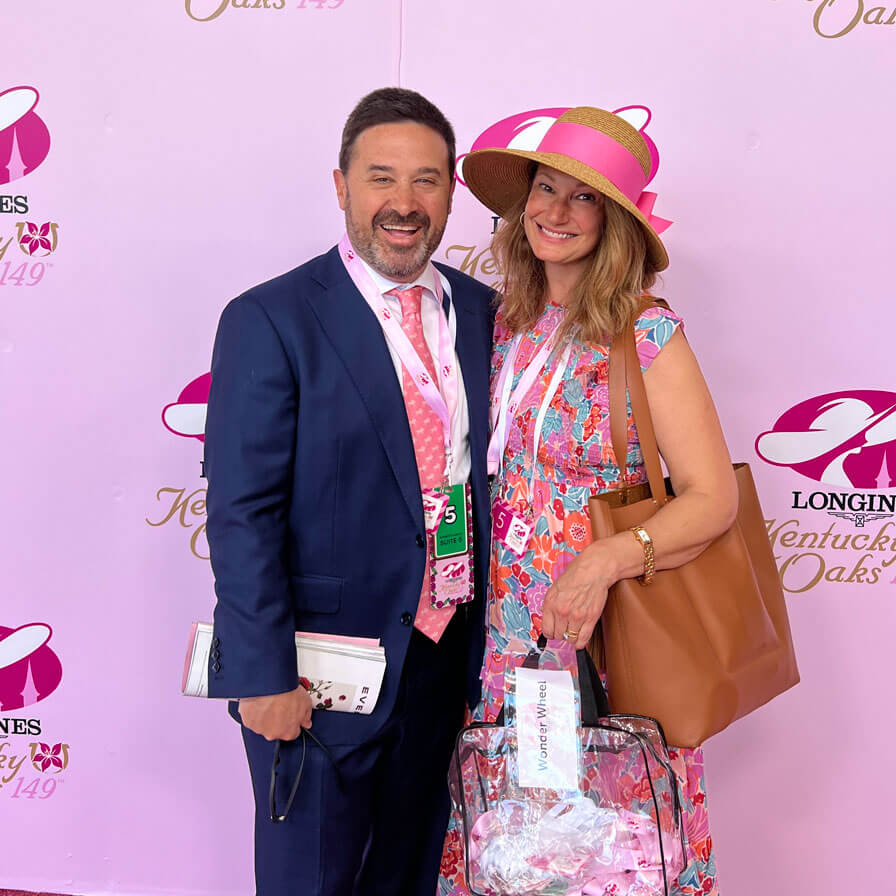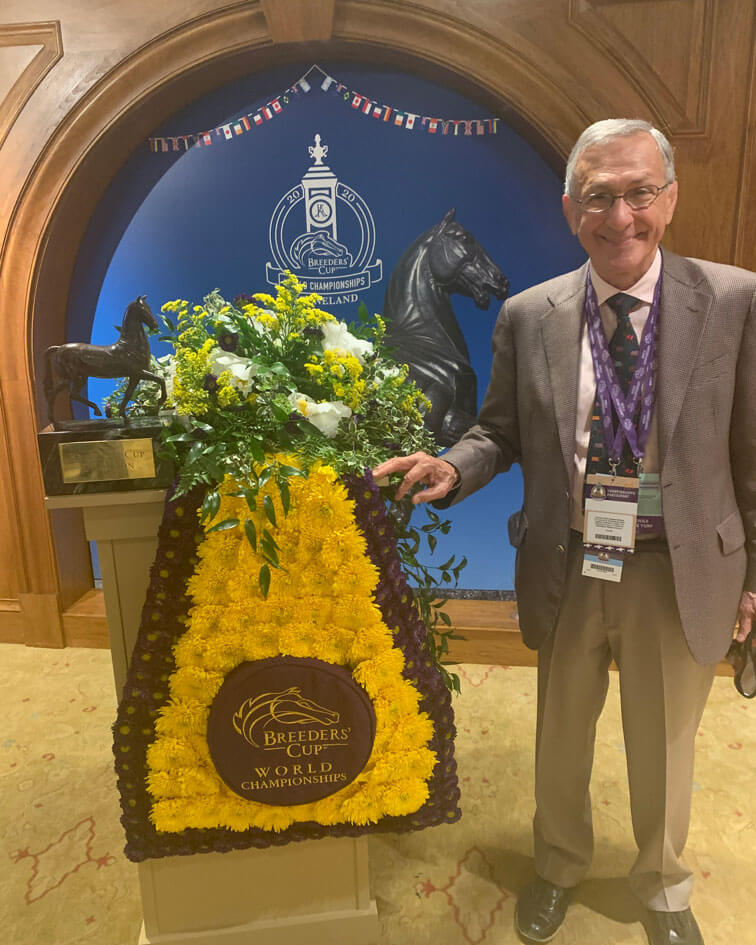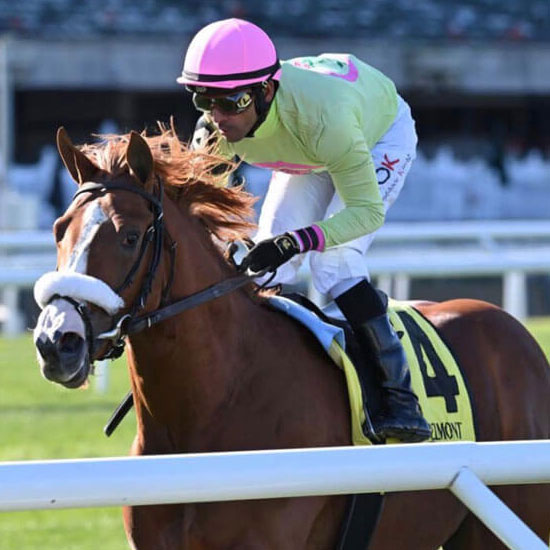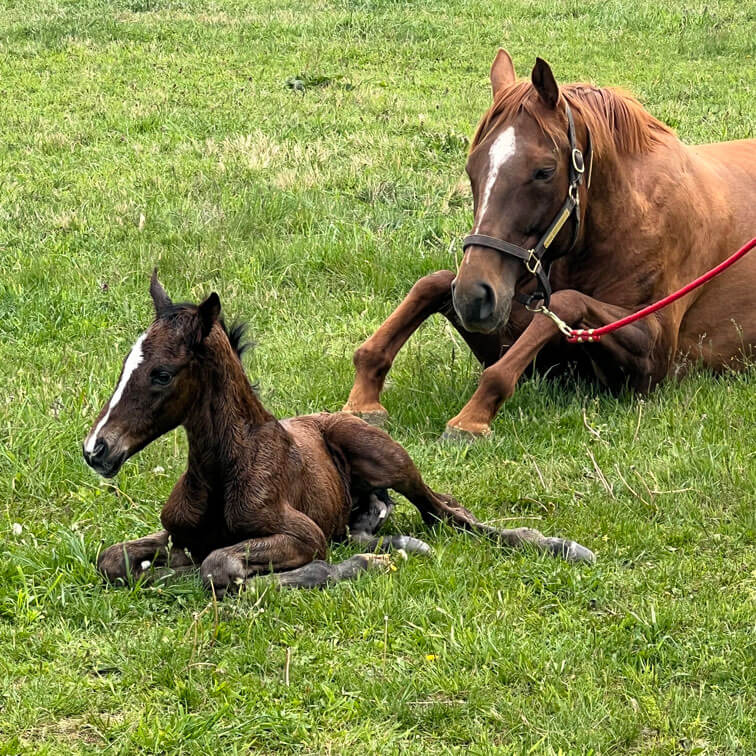A summer evening at the track. A lovely hat for the ladies and a seersucker suit for the fellas. Each holds a shandy and selects a winner based on odds, a name, or a hunch.
While most people understand the pomp and excitement of going to the races, it doesn’t mean they understand the intricacies of the horse racing industry.
Jon Green ’92, general manager of DJ Stable, and Mike Caruso ’67, former president of Caruso Benefits Group, share their insider information as two very successful owners of several championship horses.
Got into racing
Jon Green (JG): When I was in elementary school, my dad played competitive tennis. One summer, he popped his Achilles tendon and was in a cast from his hip to his ankle. For a month, my job was to wheel him around the neighborhood. We went to Monmouth Park with a neighbor whose horse won — it looked so easy!

After that day, my dad spent the rest of the summer pouring over IRS tax codes for the horse industry to understand the unique aspects, nuances, and tax advantages. He then bought a horse, and we were all hooked. So when I started to look at business programs at colleges, I liked that Lehigh had nine race tracks within 150 miles of campus.
Mike Caruso (MC): 40 years ago I was working long hours, and my wife told me I should find a diversion. That weekend I went to the track with a friend and soon was on a ranch where I bought 20% of a horse. I had small percentages in a few horses. It was the only sport where you could lose 80% of the time and still be successful.
When my wife passed away, I thought I would get out of it, but I then was introduced to Mike Dubb, an owner who was looking for other partners. When you have more partners and pool your investment, you have more money to buy better horses. It also spreads the risk. Mike and his philosophy brought me to a new level.
Time at Lehigh
JG: Lehigh has one of the top business and accounting programs in the country, so I, of course, studied communications. I was sports editor of The Brown and White and was the play-by-play announcer for multiple sports on the campus radio station, WLVR. My journalism professor, Jack Lule, encouraged me to “write what you know,” so my senior thesis focused on horse racing. He was right, and my paper won a writing award.

I graduated and began to work in the marketing department of an accounting firm. While there, I became interested in estate and financial planning and secured multiple FINRA [Financial Industry Regulatory Authority] licenses, ultimately earning my certified financial planning designation. Some partners and I established a full-service financial planning firm, which I sold in 2018 in order to focus fully on horses.
MC: I had a successful wrestling career at Lehigh. I was an NCAA champion, winning titles in 1965, 1966, and 1967 at 123 pounds. I had a career record of 57-1. I was honored to be voted into the National Collegiate Wrestling Hall of Fame in 1991, Lehigh Athletics Hall of Fame in 1993, and the U.S. Amateur Wrestling Hall of Fame in 1991. In business, I founded and served as president for many years of a benefits management company, Caruso Benefits Group. Lehigh gave me so much, so I am proud to have given back. I am a trustee emeritus, I’ve established several scholarship funds, the wrestling complex bears my name, and I serve as chairman of the Tower Society.
Racing success
JG: Many horse owners do this as a hobby, but there is such a steep learning curve to understand the athletes, politics, strategy, veterinary care, and genetics. Luckily, my Lehigh education has given me a business-like approach and a thirst for knowledge. It takes time to find the best athlete you can afford.

When I started full-time, I wanted to reinvent what we were doing and focused on the quality of our horses, our breeding program, and our wins. We now have 200 horses in seven states and four countries. Our operation was in the top five for the number of wins in the country. In 2019, Jaywalk won the Breeders’ Cup Juvenile Filly division. In 2022, Helium ran in the Kentucky Derby. In 2023, Wonder Wheel won the Breeders’ Cup Juvenile Filly division as well.
There are about 20,000 foals a year, but only two champions in each crop. For us to own and manage two champion fillies is a combination of diligence, strategy, and our blueprint for success.
MC: My first real success came from a horse called, aptly enough, Grace Hall. She placed fourth in the Breeders’ Cup and was a grade 1 winner, the highest level in racing. Our horses won several Breeders’ Cup races over the course of three years: 2018, 2019, and 2020. Monomoy Girl won 17 of her 18 races and then was sold to a breeder for nearly $10 million. In the last eight years, we have had five Eclipse Award winners, which honors the top horse in each category, much like the Academy Awards.
As a business, owners need to decide if you let winners ride, have a shorter life on the track, or monetize your successful horses. A horse must earn about $100,000 to race on a major track because trainers and jockeys get a percentage of earnings, and there are daily room and board rates along with veterinary fees and travel costs. That doesn’t even include amortizing the purchase of a horse.
Owners are often dreamers. We see a two-year-old horse and picture a derby winner. The reality is you ultimately have to sell or syndicate your top horses in order to remain profitable.
Horse safety
JG: Horses have no voices and rely on people who do things the right way. It is our job to root out those who are not following the rules. I am diligent about this work and sit on the executive committees of four different boards to help make the industry safer, cleaner, and fairer for the athletes.

MC: We shouldn’t have one death. We must continue to care for the horses’ safety. I believe that is being done currently. The industry is also finding homes and farms for horses to have a happy retirement after their racing careers are over.
Horse names
JG: It is a fun part. Names are supposed to serve as reminders of a horse’s family lineage and pedigree. For example, Jaywalk was the daughter of Cross Traffic. I have a series of horses that are named after hockey greats: Nyquist, Lemieux, and Brodeur. The one horse we named Lehigh never won a race.
MC: I have named a few horses after some passions: St. Benedict’s Prep after my high school. St. Luke’s after a local health network. Dr. Jeff after a local prominent physician. Mike from P’burg after Mike Perrucci, in honor of a local well-known entrepreneur. Tough Street, the name of the biography by my wrestling coach at Lehigh, Gerry Leeman. This is a fun part of the business.